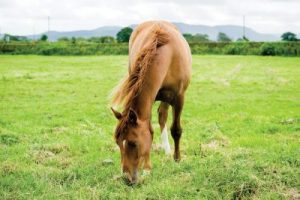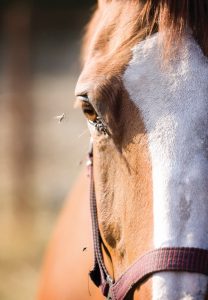So Garlic– Does it really work to keep the flies away? And if so why?
We are coming to the time of year when flies become a concern, although exactly when the flies will arrive is generally dependent on the weather conditions. This is even more of a worry for those whose horses are afflicted by sweet itch which is a horrible condition and distressing for both the horse and the owner in differing ways.
In most cases within the range of a naturally free horse there will be a grazing area,  some form of shelter, a source of water and an area of shade where horses congregate to avoid the ferocity of biting flies1 and in most cases we would try to improve on this for our own horses. However, domestication of the wild horse has resulted in many changes to the horse’s natural behaviour since challenges such as supply of food, shelter and protection have been overcome through modern management practises2. Yet, survey data from the UK suggests that approximately 30% and 55% of horses are kept entirely outside during Spring and Summer respectively, therefore reducing their access to shelters3. Unfortunately, these times that horses are less well sheltered also correlates with an increased prevalence of biting insects4. When horses cannot escape biting insects this has a direct impact on their foraging behaviour changing the frequency and timing of grazing activity5. Certain areas are more badly affected than others for flies, standing water can be particularly bad and some horses are more affected than others so managing your routine to minimise discomfort to your equine is paramount.
some form of shelter, a source of water and an area of shade where horses congregate to avoid the ferocity of biting flies1 and in most cases we would try to improve on this for our own horses. However, domestication of the wild horse has resulted in many changes to the horse’s natural behaviour since challenges such as supply of food, shelter and protection have been overcome through modern management practises2. Yet, survey data from the UK suggests that approximately 30% and 55% of horses are kept entirely outside during Spring and Summer respectively, therefore reducing their access to shelters3. Unfortunately, these times that horses are less well sheltered also correlates with an increased prevalence of biting insects4. When horses cannot escape biting insects this has a direct impact on their foraging behaviour changing the frequency and timing of grazing activity5. Certain areas are more badly affected than others for flies, standing water can be particularly bad and some horses are more affected than others so managing your routine to minimise discomfort to your equine is paramount.
 Flies affect most horses and ponies, although some more than most, and their owners! However why are flies such a problematic insect to the equine? It has long been understood that bites from insects are not just an annoyance but in certain circumstances can cause allergic dermatitis on the horse’s skin commonly referred to as sweet itch6. Horses with sweet itch can acquire secondary infections due to the broken skin7 which may result in veterinary treatment, usually by rubbing the affected area, and this can be distressing for the horse but also the owner, but how do the insects know where the animal is? Biting insects do not visually seek out their next blood meal, instead they rely on chemical signals detected via a sense of smell8. These chemical signals include carbon dioxide (animals’ breath), ammonia (urine/faeces), ketones (sweat) and phenols (sweat)8 which explains why flies are attracted all over the horse.
Flies affect most horses and ponies, although some more than most, and their owners! However why are flies such a problematic insect to the equine? It has long been understood that bites from insects are not just an annoyance but in certain circumstances can cause allergic dermatitis on the horse’s skin commonly referred to as sweet itch6. Horses with sweet itch can acquire secondary infections due to the broken skin7 which may result in veterinary treatment, usually by rubbing the affected area, and this can be distressing for the horse but also the owner, but how do the insects know where the animal is? Biting insects do not visually seek out their next blood meal, instead they rely on chemical signals detected via a sense of smell8. These chemical signals include carbon dioxide (animals’ breath), ammonia (urine/faeces), ketones (sweat) and phenols (sweat)8 which explains why flies are attracted all over the horse.
In order to minimise the effect of biting flies, different management strategies can be adopted including stabling during risk periods i.e. dawn and dusk, utilising fly sheets or rugs that prevent flies landing on the horse or using fly sprays9. Stabling is a very useful technique, but in lockdown conditions may be difficult for some people to achieve this year. Fly rugs can be very effective as long, as you don’t have a ‘rug thug’, as they create a physical barrier to the fly. There are countless fly sprays on the market, however they are generally effective only when applied regularly. Many people will have a favourite fly spray and rave about their chosen one, but the best way is to try them out and see what works for your situation however an alternative approach is to use nutrition to help.
Garlic, Allium sativum, is a herb with a pungent odour that has been utilised by humans for centuries10. ![]() Consuming garlic can have the unsocial effect of odorous perspiration within humans11 and the effect is also seen in livestock species, including horses. Despite there being no published evidence on the efficacy of garlic as a natural insect repellent, anecdotal evidence suggests animals consuming garlic for a sustained period of time are bothered less by biting flies. It is believed that the odour associated with consuming garlic masks the chemical signals given off by the horse and makes them less ‘visible’ in terms of smell to biting insects.
Consuming garlic can have the unsocial effect of odorous perspiration within humans11 and the effect is also seen in livestock species, including horses. Despite there being no published evidence on the efficacy of garlic as a natural insect repellent, anecdotal evidence suggests animals consuming garlic for a sustained period of time are bothered less by biting flies. It is believed that the odour associated with consuming garlic masks the chemical signals given off by the horse and makes them less ‘visible’ in terms of smell to biting insects.
Horslyx Garlic Balancer contains pure garlic oil to help provide a natural, effective and long-lasting way to help combat the problem of biting insects. Independent research, using Horslyx Garlic Balancer, conducted at Aberystwyth University reported that horses offered Horslyx Garlic Balancer had 64.5% less landing on them compared to control, unsupplemented, horses. A follow up study with horses who were already showing symptoms of sweet itch resulted in horses offered Horslyx Garlic Balancer spending less time on behaviours associated with sweet itch relief compared to unsupplemented horses. This research concluded: “Feeding Horslyx Garlic Balancer helped to alleviate irritation caused by sweet itch, which in turn may reduce stress, making for a happier, more responsive and co-operative horse”. The fly deterrent properties of Horslyx Garlic Balancer are not reliant on a person visiting to apply fly protection, but they are simply present 24 hours a day to help reduce the irritation from flies and other biting insects.

